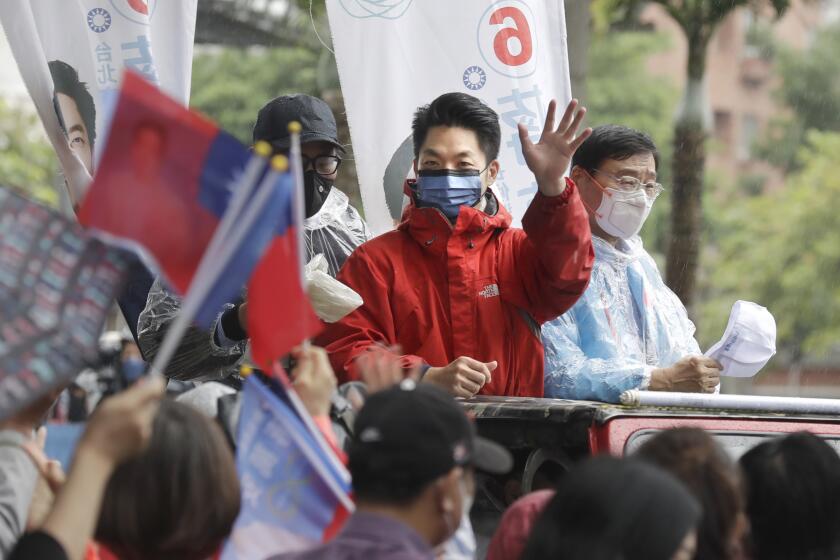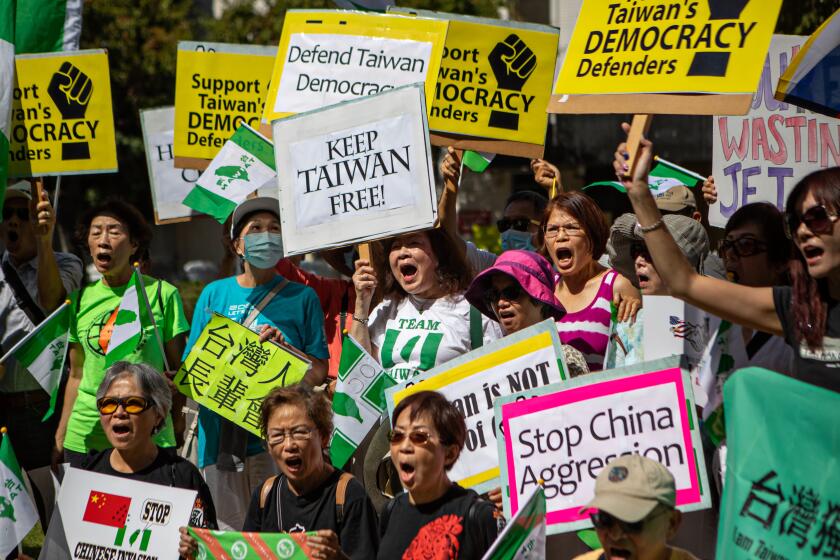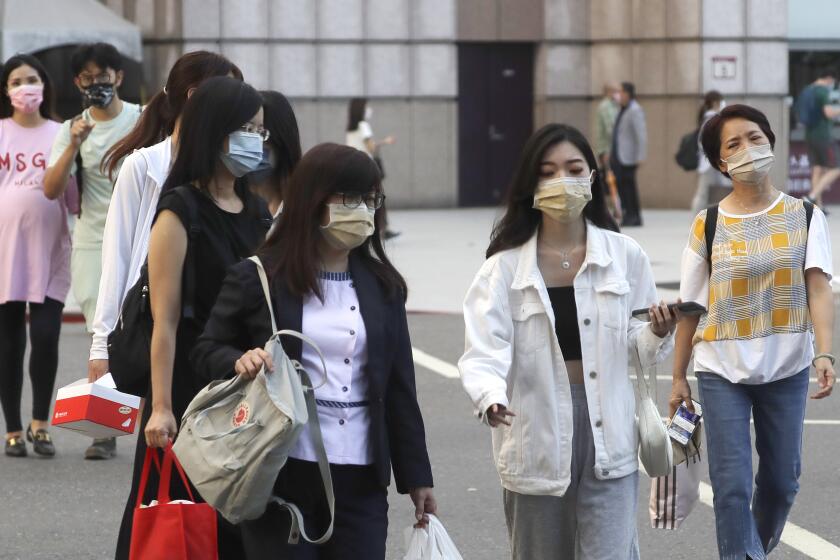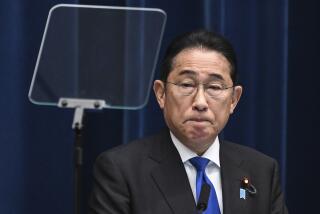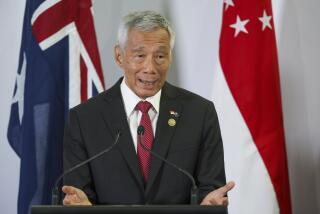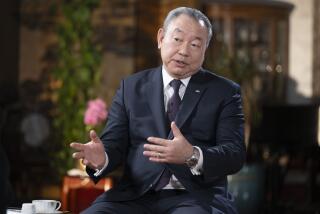Taiwan’s president resigns as her party’s leader after election losses
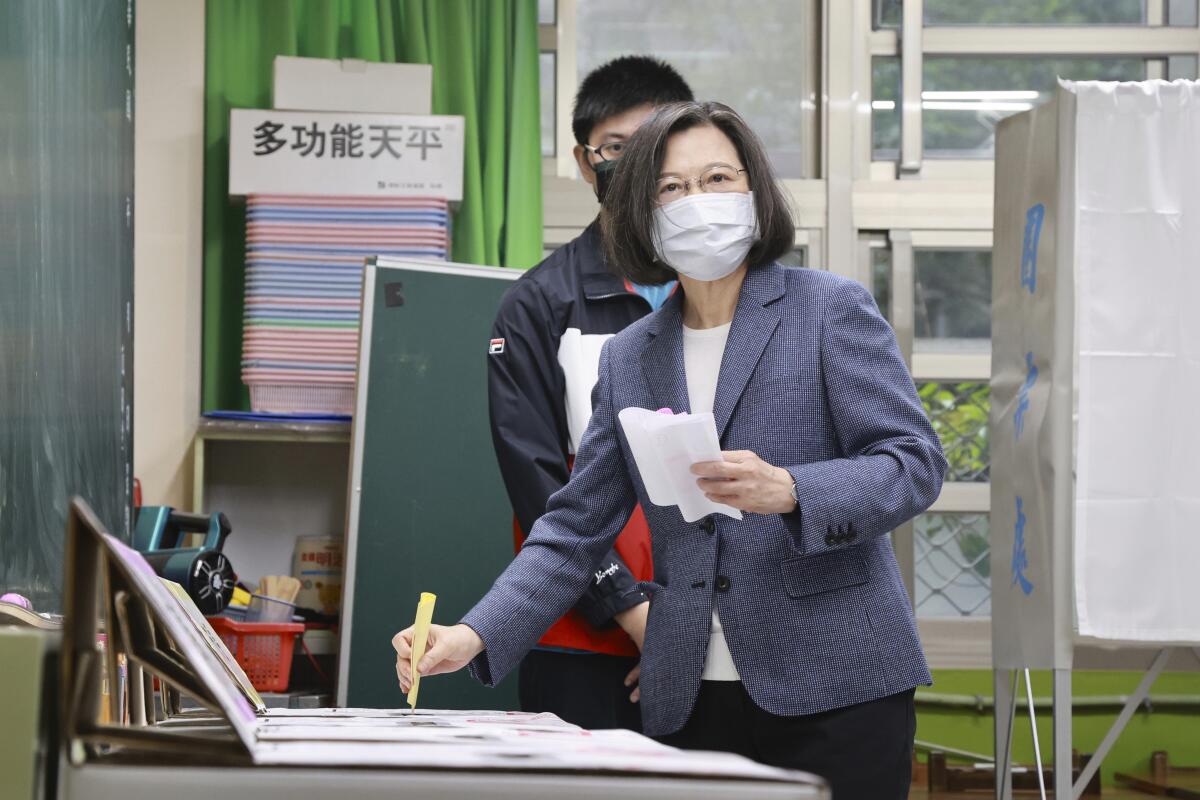
- Share via
TAIPEI, Taiwan — Taiwanese President Tsai Ing-wen resigned as head of the ruling Democratic Progressive Party on Saturday after local election losses suffered by her party.
Voters in Taiwan overwhelmingly chose the opposition Nationalist Party, or Kuomintang, in several major races across the self-ruled island in an election in which lingering concerns about threats from China took a backseat to more local issues.
Tsai had spoken out many times about “opposing China and defending Taiwan” in the course of campaigning for her party. But the party’s losing candidate for mayor of Taipei, Chen Shih-chung, raised the issue of the Communist-ruled mainland’s threat only a few times before he quickly switched back to local issues, as there was little interest, experts said.
Tsai offered her resignation Saturday evening, a tradition after a major loss, in a short speech in which she also thanked supporters.
“I must shoulder all the responsibility,” she said. “Faced with a result like this, there are many areas that we must deeply review.”
While international observers and the ruling party have attempted to link the elections to the long-term existential threat posed by the mainland, many local experts do not think China — which claims the island as its territory, to be annexed by force if necessary — had a large role to play.
Taiwan’s nationalist party is looking to the purported great-grandson of Chiang Kai-shek to refurbish its image.
“The international community has raised the stakes too high. They’ve raised a local election to this international level, and [emphasized] Taiwan’s survival,” said Yeh-lih Wang, a political science professor at National Taiwan University.
During campaigning, there were few mentions of the large-scale military exercises targeting Taiwan that China held in August in reaction to U.S. House Speaker Nancy Pelosi’s visit.
“So I think if you can’t even raise this issue in Taipei,” Wang said, “you don’t even need to consider it in cities in the south.”
Candidates from the Nationalist Party won the mayoral seat in Taipei, Taiwan’s capital, as well as in New Taipei City, Taoyuan and Taichung.
Yes, I am Taiwanese American, but I regret to inform you that I will not be taking a side on whether House Speaker Nancy Pelosi was right to visit Taiwan last week.
Taiwanese were picking their mayors, city councilors and other local leaders in all 13 counties and in nine cities. There was also a referendum to lower the voting age from 20 to 18, which was defeated, according to local media.
Chiang Wan-an, a great-grandson of longtime Republic of China President Chiang Kai-shek, declared victory in the Taipei mayoral race Saturday night at a large rally. “I will let the world see Taipei’s greatness,” he said.
Not all votes had been formally counted by the time of his speech, but Chiang and the other candidates’ numerical lead allowed them to declare victory.
Kao Hung-an, a candidate from the relatively new Taiwan People’s Party, won the mayoralty in Hsinchu, home to many of Taiwan’s semiconductor companies.
News Alerts
Get breaking news, investigations, analysis and more signature journalism from the Los Angeles Times in your inbox.
You may occasionally receive promotional content from the Los Angeles Times.
Campaigns had resolutely focused on local issues, such as air pollution in the central city of Taichung, traffic snarls in Taipei’s Nangang tech hub and the island’s COVID-19 vaccine-buying strategies, which had left Taiwan in short supply during an outbreak last year. The defeat of the Democratic Progressive Party, or DPP, may be partly due to how it handled the pandemic.
“The public has some dissatisfaction with the DPP on this, even though Taiwan has done well, relatively speaking, in pandemic prevention,” said Weihao Huang, a political science professor at National Sun Yat-sen University.
At an elementary school in New Taipei City, which surrounds Taipei, voters turned out early Saturday despite the rain.
Taiwan is considering an end to its COVID-related quarantine requirement for all arrivals in mid-October.
Yu Mei-zhu, 60, said she came to cast her ballot for incumbent Mayor Hou You-yi. “I think he has done well, so I want to continue to support him. I believe in him, and that he can improve our environment in New Taipei City and our transportation infrastructure.”
Tsai, the president, came out early Saturday to cast her ballot, catching many voters by surprise as her security force and entourage swept through the school.
“If the DPP loses many county seats, then their ability to rule will face a very strong challenge,” said You Ying-lung, chair of the Taiwanese Public Opinion Foundation, which regularly conducts public surveys on political issues.
Some felt unmotivated by the election. “It feels as if everyone is almost the same, from the policy standpoint,” said 26-year-old Sean Tai, a hardware store employee.
Tai declined to say whom he voted for, but wants someone who will raise Taipei’s profile and bring better economic prospects while keeping the status quo with China. “We don’t want to be completely sealed off. I really hope that Taiwan can be seen internationally,” he said.
More to Read
Sign up for Essential California
The most important California stories and recommendations in your inbox every morning.
You may occasionally receive promotional content from the Los Angeles Times.
